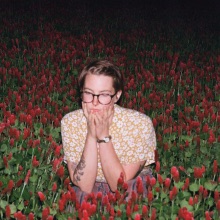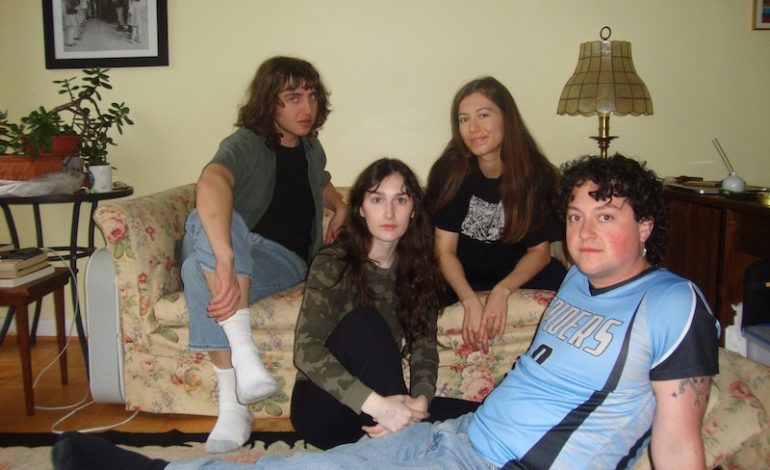
In a reality where apathy is endemic to unending overwhelm and nihilism offers a welcome reprieve, it can seem near impossible to have it all figured out. As we search for something to make it all worth it, to come up for air, the intricacies of contemporary existence bursts into cacophonous borders. As mui zyu, Hong Kong British artist Eva Liu searches for a portal, wandering between nothing and everything in her pursuit of peace. On her second full-length album nothing or something to die for she looks outward, embracing the chaos with each tentative step. With an eye to the absurd, it asks: how do we find the hole in the wall––the portal––to the path we all crave?
Check out “everything to die for” below:
mui zyu’s debut album Rotten Bun for an Eggless Century (Father/Daughter) saw her explore her heritage, as she dived inward to find acceptance and healing. Now, instead of searching for answers from the inside, Liu raises her head to look at the world around her. As she attempts to understand the complexities and significance of human existence, she observes apathy alongside overwhelming chaos; the technological advancements of connection with the lack of meaningful bonds and the frustrations of upholding standards set by others. nothing or something to die for tries to decipher these juxtaposing truths, holding both the weight of those trying to destroy the world with the utter futility of it all.
This isn’t an album of despair or defeat, but rather a message of encouragement. Peace and contentment feels different for everyone, but if we stick to our instincts, some form of it will come to fruition. While Liu explains that she’s very much still figuring out who she is, her pursuit of some sort of exhale has allowed her to quiet the voices of pressure and cement her integrity. Working with Rotten Bun for an Eggless Century co-producer and fellow Dama Scout band member Luciano Rossi, the sonic world of nothing or something to die for encapsulates both the fleeting tranquility of serenity and the dissonance in chasing it. After all, our reality can change in an instant.
It was the first time Liu and Rossi worked outside of their home studio, instead embarking on a week-long stint at Middle Farm Studios in Devon. The change of scenery allowed for more experimentation, as the studio boasted instruments and gear Liu had never worked with before. Much like you can go anywhere in life, Liu felt that she could go anywhere sonically; vocal manipulation like hard tuning is used intentionally to conjure images of overly plastic lives while running instruments through tape machines and pedals provokes a sense of entropy and uncertainty. Like the psychedelic tones of Ryuichi Sakamoto’s Thousand Knives, the urgent techno-pop of Miharu Koshi’s Parallelisme or the eerie wanderings of Angelo Badalamenti’s work for Twin Peaks, nothing or something to die for expertly toes the line between disorder and clarity.
Opener “satan marriage” starts with burgeoning strings, all performed by female musicians of East Asian heritage. It was inspired by the momentous 2001: A Space Odyssey scene, which sees Bowman discover a third, much larger monolith orbiting the planet. Liu was particularly inspired by its visuals: as he’s pulled into a vortex of lights and carried across vast distances of space and cosmological phenomena, “satan marriage” too, captures the strange, urgent beauty of the things we cannot fully comprehend.
The heaviness of this introduction ends with a child-like, lighthearted electronic drum beat that filters into “the mould”; the contrast of seriousness with light kitsch. “the mould” presses for optimism, motivating us to no longer live in regret and to instead embrace both the mould of our past trauma–our decay–and the mould of who we are, our caste. “When something is mouldy, is it actually going bad? Or has it changed for the better?” she asks.
Liu describes the sauntering, guitar-led “everything to die for” as an apocalyptic love song, showcasing how easy it is to hurt the ones we love, and how our shadow selves can breach the surface when we’re in love. It’s an intimate dance, with moments of chromatic dissonance that offer a discomforting underbelly. As gentle and sweet as love can be, it can be strangely cruel. “the rules of what an earthling can be” sees Liu turn her eye toward the misogyny women face, particularly in Chinese culture, when they don’t find marriage. The bright electronic keys float above the suffocating nature of the lyrics, reaching for something other than the heteronormative rule book put in place by so many.
The robotic yearnings of “please be ok”, featuring Queens-based musician Miss Grit, reckons with the pressure of hiding our true feelings in order to appease others, and our fears about growing older. The song’s eruptive finale is a release of repression, and a pleading, primal cry of acceptance. It’s a feeling that’s carried through on “sparky”, featuring lei, e (formerly Emmy The Great). Inspired by the dog in the opening scene of Blue Velvet, who bites the water in front of their dead owner, this search for a simple, honest happiness is warped with mechanical autotuned harmonies and distorted percussion. Nihilism to elation, and back again. Elsewhere, the playful “in the dot,” featuring fellow Father/Daughter artist Pickle Darling, points to our insignificance and the triviality of our destructive endeavours. Longing for simpler times is presented with dreamlike strings, while Liu encourages us to stay in the present and care more about the things that matter.
Despite the sorrow and fragility of searching for some kind of solace, nothing or something to die for is an album that also celebrates those moments of connection, especially with ourselves. The sweet tones of “cool as a cucumber” acknowledges the importance of honesty and bravery, despite the pressures that discourage us to be ourselves. Much like “satan marriage” opened a portal, here Liu is deciding to close it, to come up for air, recognizing the hard work it takes to exist truthfully.







1 Comment
6f8tft